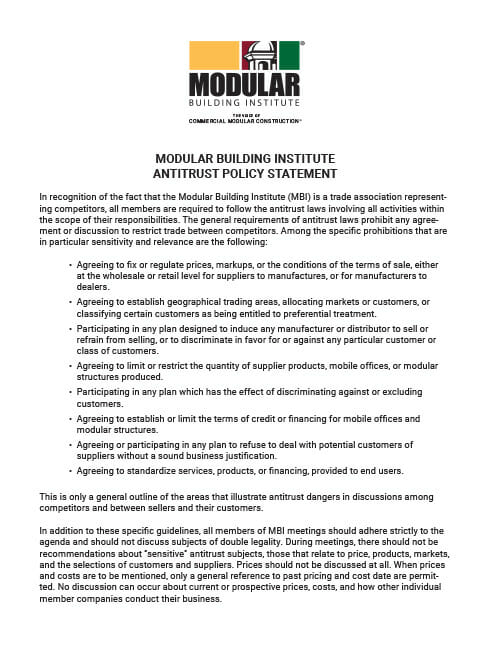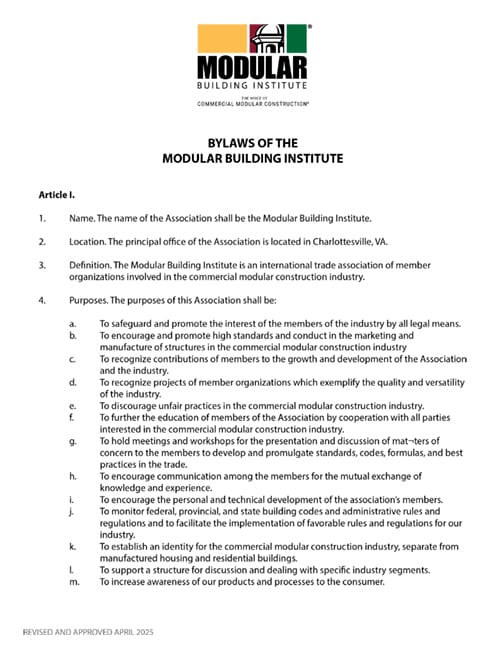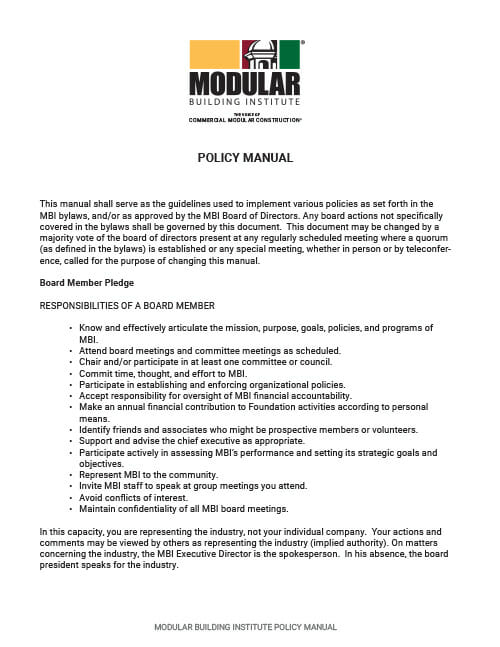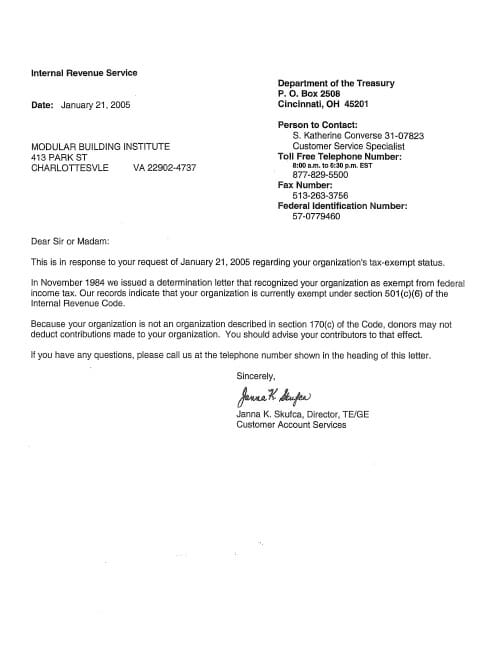Environmental, Social, and Governance (ESG) in Modular Construction
ESG stands for Environmental, Social, and Governance. According to McKinsey:
- The "E" in ESG, environmental criteria, includes the energy your company takes in and the waste it discharges, the resources it needs, and the consequences for living beings. At the Modular Building Institute (MBI), we recognize the significance of environmental considerations and strive to promote sustainable practices within the modular construction industry. Not least, "E" encompasses carbon emissions and climate change. Every company uses energy and resources; every company affects, and is affected by, the environment.
- "S," social criteria, addresses the relationships your company has and the reputation it fosters with people and institutions in the communities where you do business. "S" includes labor relations and diversity and inclusion. Every company operates within a broader, diverse society.
- "G," governance, is the internal system of practices, controls, and procedures your company adopts in order to govern itself, make effective decisions, comply with the law, and meet the needs of external stakeholders. Environmental, social, and governance (ESG) factors are integral to legal and sustainable business practices in the modular building industry.
Environmental
Environmental considerations include waste management, energy efficiency, air and water pollution, climate change and carbon emissions. MBI has conducted research to demonstrate the ability of the modular construction industry to have a positive impact on the environment compared to traditional “site built” projects.
In a study by Professor Mohammed Al-Hussein at the University of Alberta, the research found that by using modular construction, the overall schedule was shortened by four months on an 11-month project and CO2 emissions were reduced by 43 percent.
The University of Virginia conducted a study (Quale, et.al.) using life cycle assessment to quantify the environmental impacts of constructing a typical residential home using two methods, based on data from several modular construction companies and conventional homebuilders. The study, peer-reviewed and published in the Journal of Industrial Ecology, included impacts from material production and transport, off-site and on-site energy use, worker transport, in terms of materials usage and waste, homes constructed using a modular process were found to use about 17 percent less material overall. This reduction in material usage aligns with the principles of environmental, social, and governance (ESG) practices.
This included greater material use for modular mate lines and transportation but significantly less material waste for modular. In fact, the modular homes sent about 75 percent less wood and drywall waste to the land fill per project (1,380 lbs. for modular vs 5,500 lbs. for conventional).
Worker transport to the jobsite daily had a negative impact for conventional construction while energy use in the factory added to the environmental impact for modular construction projects. The analysis revealed that environmental impacts from modular construction are, on average, lower than those from on-site construction with total greenhouse gas emissions about 30 percent less by using modular construction.
Social
Social factors include customer satisfaction, diversity, equity, and inclusion, community relations, labor standards, and human rights are integral components of environmental, social, and governance (ESG) considerations.
MBI’s adopted Code of Conduct, required for every member, promotes integrity, honesty, and fairness when dealing with customers, vendors, and competitors. Our members pledge to treat suppliers, manufacturers, and vendors in a professional manner and as part of the project team and to adhere to honesty and integrity and to generally accepted principles of professional conduct.
One of MBI’s strategic goals has been to help address the shortage of affordable housing. We have worked with numerous housing authorities and agencies to help expand the resources available to these agencies. We worked extensively with the Canadian Mortgage Housing Corporation to help launch their “Rapid Housing Initiative” which has delivered 8,000 affordable housing units in the last two years.
Each year, MBI’s Educational Foundation provides $5,000 in educational scholarships to employees of MBI member companies or employee spouses, children, or grandchildren, reflecting MBI's commitment to environmental, social, and governance (ESG) principles. The MBI Foundation provides one $2,500 scholarship and the Canadian Foundation provides one $2,500 scholarship. To date, these foundations have provided over $80,000 in total scholarships.
Modular construction has demonstrated the ability to provide a safer environment for workers. By shifting as much as 80 percent of the building construction to an off-site, factory-controlled setting, workers have a much more predictable and consistent work atmosphere. Additionally, the ability to construct multi-story buildings in modules while remaining on the ground floor of a factory virtually eliminates hazards associated with falls, one of the most common accidents in the construction industry.
MBI is committed to increase the opportunities for women and minorities within our workforce, our membership, and within the association leadership. In 2021, MBI signed on to the National Institute of Building Sciences “Built Environment CEO Diversity Commitment” to support greater diversity in the built environment.
Governance
The Modular Building Institute (MBI), operating under strong environmental, social, and governance (ESG) principles, is a 501(c)(6) non-profit trade association. Formed in 1983, MBI represents manufacturers, contractors, builders, suppliers, and other companies and professionals working in the commercial modular construction industry.
Guidestar (Candid)

GuideStar (now Candid) is one of the first central sources of information on U.S. nonprofits and is the world's largest source of information about nonprofit organizations. MBI earned the Guidestar Gold Level in 2021 for operational transparency.
To view more information about MBI, visit guidestar.org.
Board of Directors
Board members of the Modular Building Institute represent member companies from all over the world. Each member serves a one-year term.
Councils & Committees
MBI's growth relies on the expertise and leadership of its members. To facilitate this growth, MBI created a variety of volunteer committees and councils to help advise its Board of Directors on issues and points of view from around the industry and around the world.
International Councils
European Council
Co-chair:
Bostjan Jevsek
Iteraspace
Co-chair:
Ewelina Wozniak-Szpakiewicz
DMDmodular
Canadian Council
Chair:
Ted Redmond
Black Diamond Group
Vice Chair:
Joe Kiss
ROC Modular
South American Council
Chair:
Christian Goldberg
Tecno Fast S.A.
Vice Chair:
Pablo Domecq
EcoSan
Vice Chair:
Bruna Rafaela Xavier
CMC Modulos Construtivos Ltda.
Committees
Executive Committee
Chair:
Stephen Shang
Falcon Structures
Business Development Committee
Chair:
Steve Danielson
Satellite Shelters
Vice Chair:
Ludovich Gauvin
SM Construction
Government Affairs Committee
Chair:
Kam Valgardsen
Irontown Homes
Vice Chair:
Samantha Taylor
Steenhof Building Services
Professional and Workforce Development Committee
Chair:
Sara Logan
Volumetric Building Companies
Co-Chair:
Keith Jeremiah
Risus Talent Partners
Public Relations Committee
Chair:
Rhys Kane
ROC Modular
Vice Chair:
Rachael Ulmer
Modular Genius
Finance & Audit Committee
Chair:
Kent Anderson
Wesco Distribution
Leadership Development Committee
Chair:
Stephen Shang
Falcon Structures




